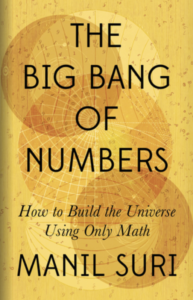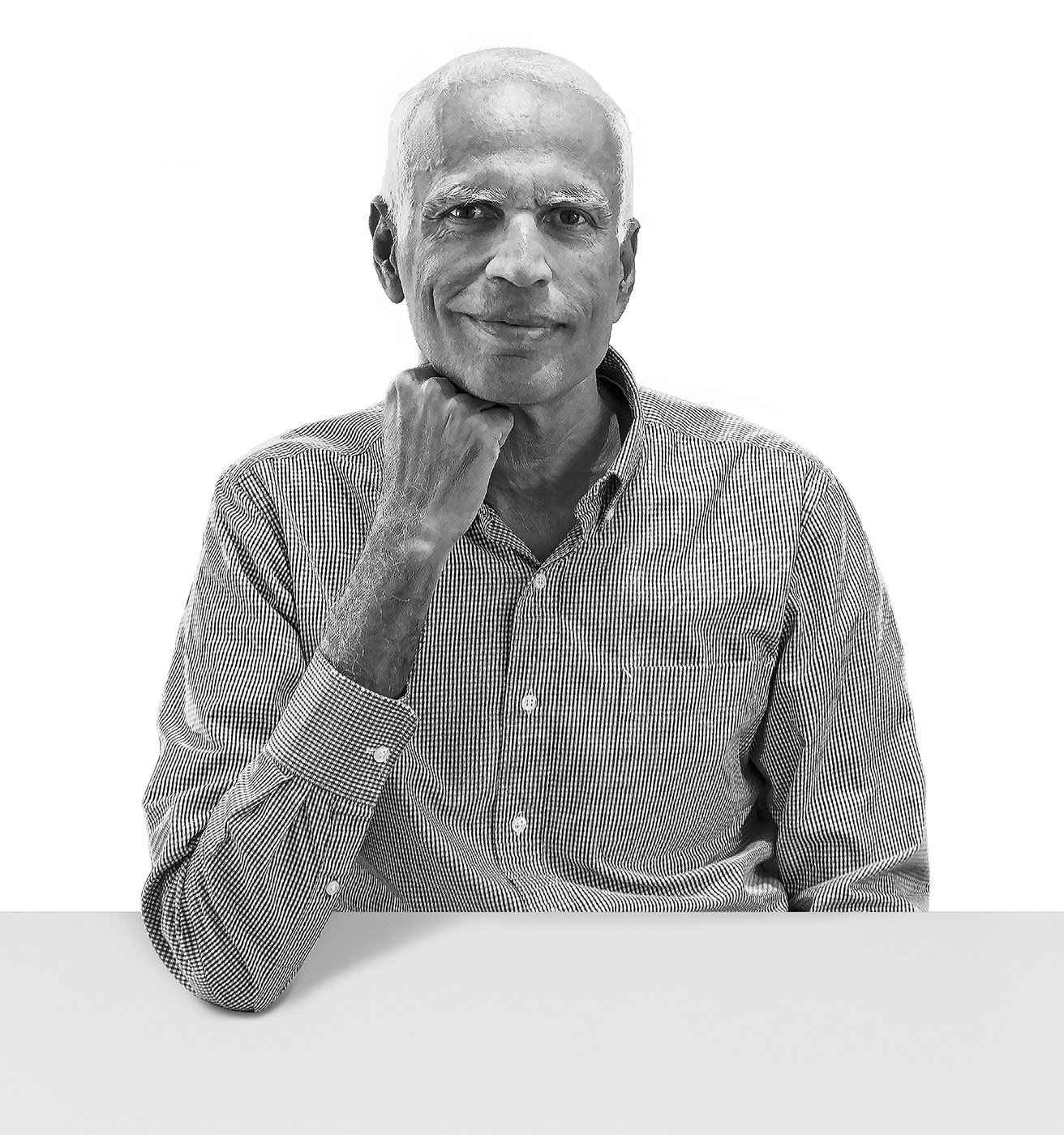Manil Suri is a mathematician, so it shouldn’t be surprising that his new book is about math. And yet if you’ve followed his career, this does represent an unexpected twist—because Suri is best known as a novelist. A professor at the University of Maryland, Baltimore County, who lives in Silver Spring, he’s written three well-regarded works of fiction set in his native India, including 2001’s The Death of Vishnu, which was long-listed for the Booker Prize.
But The Big Bang of Numbers is something different: Suri’s attempt to explain why math matters to the kind of creative people who might more naturally be drawn to his fiction. The concept is intriguing, if hard to get your head around: Can you understand the creation of the universe purely through basic mathematics?
The book digs into a number of such abstract, world-building brain games. For example, Suri attempts to explain infinity, a concept he’s particularly fond of, by imagining a war between two planets, each of which has an unending supply of weapons, then showing you—using math!—how one could theoretically prevail. It’s a class in mental Minecraft that may just provide you with an answer to teenagers who want to know why they have to take algebra.
Why is thinking about the origins of the universe a good way to convince people that math might be fun?
The usual way people think about doing math outreach is to say, hey, let’s show people where math is used and how it can apply to daily life. That works really well for people who already like math. It’s hard to get other people to feel invested in the subject unless they’re playing with it. That’s part of the fun of being a mathematician. [Thinking about ideas like] creating the universe, creating math, creating numbers might expose people to this process that mathematicians go through and derive a lot of fun from, which is creation.
As a novelist, you must appreciate that creation is the oldest story we’ve told.
Exactly. It’s one of those things that is well documented in religious texts and philosophies. And science, physics in particular, has a lot to say about it. People keep talking about whether there’s some intelligence to the universe. And if that question is asked of me, I would argue that mathematics is the intelligence, if you want to call it that, that’s governing it. These are, you know, very theological, philosophical questions.
You had a type of religious experience with numbers when you were an 18-year-old student in Mumbai, right?
Yeah, why not call it a religious experience? I was a physics major. There’s a famous quote by [German mathematician Leopold] Kronecker that says God made the integers, and the rest is the work of man. [In a math class I took, the professor] said, “Hey, wait a minute, we can actually create the numbers as well. So we don’t have to get God into the picture.” I felt the room kind of disappear. Suddenly, you had this cosmos of numbers just going through everything. The professor kept telling me, “You should switch to math.” And that was the right decision for me.
That was a big moment. You were just on the verge of adulthood.
Yeah. He started saying, “Maybe you should think about furthering your studies somewhere else, like the US.” And then I did come to the US. The math part was certainly very important. But even more important was the fact that I was exploring the gay part of my sexuality. It was certainly much easier to do that in the US, where I had all this freedom. It all tied together, and it came out of this math course that I was taking.
In the US, I realized that math wasn’t a good way to meet people at parties. The conversation kind of ends there.
I wish I’d had a profound experience with math growing up! For me, it was just a lot of hard work that I’ve mostly forgotten. Have you found that people in the US are more ambivalent or even hostile toward math than people in other countries?
In India, if you say that you’re a mathematician, people might say, “I’m terrible at math.” That’s certainly true of a large segment of the world’s population. But the attitude is a little different—they might want to know more about what you do. In the US, I realized that wasn’t a good way to meet people at parties. You say you’re a mathematician, the conversation kind of ends there.
For a lot of people, arithmetic, a little geometry, some algebra is all they’ll ever need. But this book isn’t about the need for math.
Yes, most people would not really need the quadratic equation. You can get through life without really needing most of algebra. It’s like picking up a book on art. We don’t have any use for, let’s say, abstract expressionism. But it would be nice to know more about it! I’m approaching this book with that idea in mind. The other basic idea is, well, what does it mean to know things about the world? Many people have seen fractals. This goes a little deeper than just looking at something and saying, “Hey, that’s a pretty big trip.”

I never really understood fractals until I read your explanation of them.
Oh, that’s great. When you see a fractal with all those wonderful colors and so on, you get so much out of it visually that you say, “Hey, this is good. And this is math. So math is making me feel good.” But if you really want to get the full experience, you have to go a little deeper. This is one of the problems with outreach programs in math. I don’t know if [people] are left with enough of a grasp.
On the other hand, you don’t want to overwhelm people. It makes me think about how math is portrayed in films—you know, Matt Damon in front of a huge chalkboard filled with bewildering equations. You’re not supposed to understand what he’s thinking.
The movie stuff is often a big disappointment. For a long time, math was tied with mental illness in movies. If there’s a mathematician in the movie, he has to go crazy by the end. Movies like A Beautiful Mind, Pi, and Proof. Since then, some of the stuff we’ve seen has been a little better. The Man Who Knew Infinity actually did make a few tentative steps toward at least talking about the math.
I guess the idea behind some of those films is you’d have to be crazy to love math.
This probably happens a lot in schools, too, where if you like math, that’s not cool.
For a long time, math was tied with mental illness in movies. If there’s a math [genius], he has to go crazy.
You make the point late in the book that understanding simple mathematics can later lead to intellectual jumps that look like magic—up to and including creating life.
You can demonstrate that from very simple rules, you can get really complex patterns. Now, the complete secrets of life have not been unearthed yet. What math has been able to do, however, is give you examples that say that this is possible.
But you also write that there’s no way to prove math exists outside of our imagination.
Yeah, that’s a classic conundrum. Either math has existed forever or then there’s an equally plausible explanation that math is something that we create. These two ways are sort of complementary to each other. I started this book with numbers being created. Okay, well, how does that happen? Who does that?
Who is deciding, “I think, therefore I am”?
The nice thing about math is that mathematicians realize that you can’t prove everything. That’s where axioms come in. We say, hey, I need to start at some point. And I’m going to put this foundational break in place. Mathematicians are careful creatures; we never actually say that axioms are true. We are saying that there are assumptions, and you will agree with them but you can’t prove them. The whole of math is built from such assumptions.
I wanted to ask you about Pope Francis. You’re interested in why explanations offered by religion have found a broader audience than those offered by math, and throughout the book you explore that question by imagining you’re chatting with the pope. Did you send a copy to the Vatican?
Yeah, I got a form letter back. It said, “The pope has received your book and he’s looking forward to it.” And he’s going to pray for me. I have a friend who knew some cardinals, and I asked her if she could have me talk to the pope. Right now, they’ve just looked at it and given me this form letter. I might wake up one morning and maybe it’ll be the pope on the other line. Maybe it’ll be the pope’s lawyer.
The chances of some interaction with the pope are not zero.
Exactly.
This article appears in the October 2022 issue of Washingtonian.




















